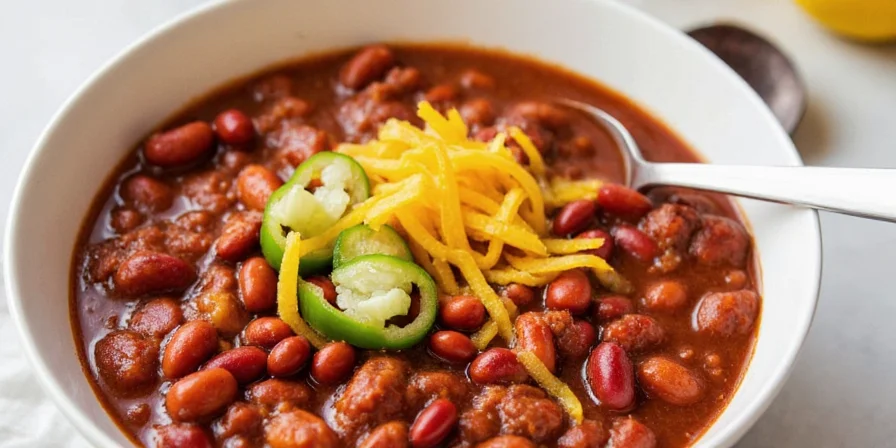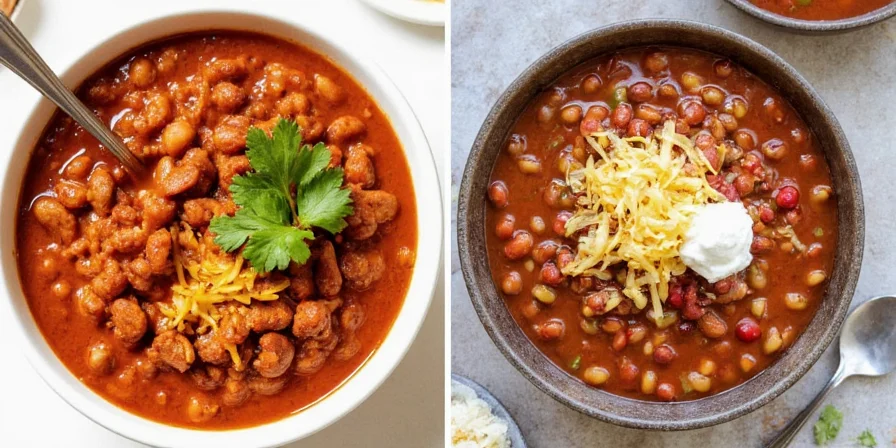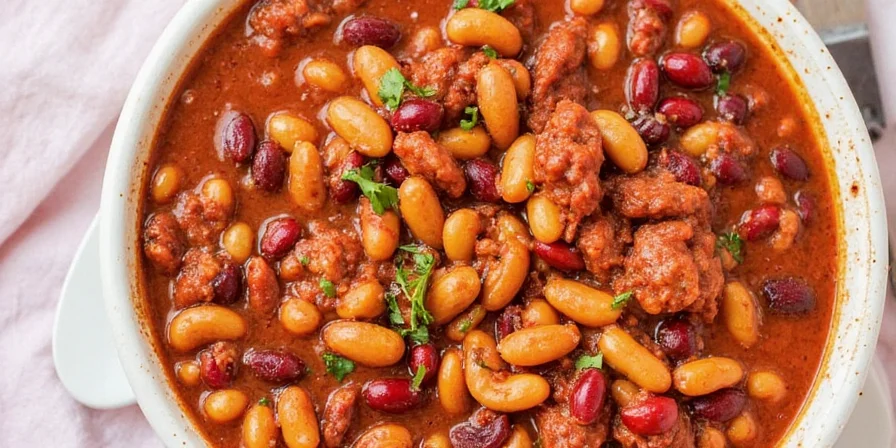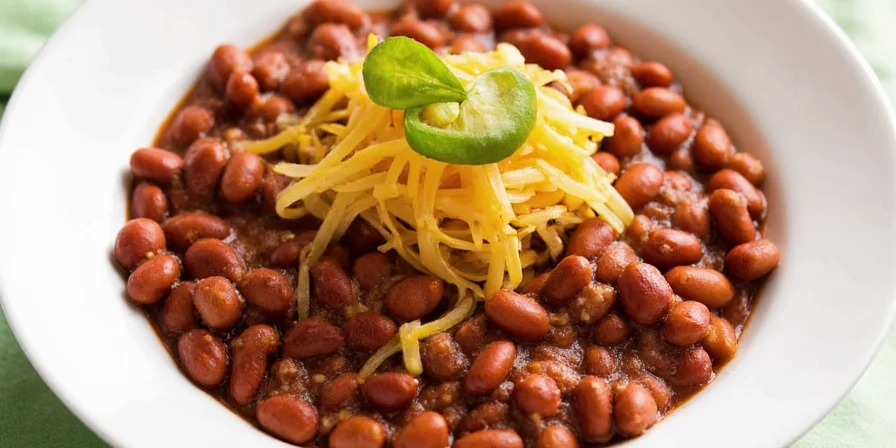Spice Up Your Life: 7 Innovative Bean Chili Recipes That Defy Tradition
When you think of a classic bean chili, the first thing that comes to mind might be slow-cooked beans, ground beef, and a familiar lineup of spices like cumin, garlic, and chili powder. But what if I told you there’s a whole world of bold flavor combinations waiting just beyond your spice rack? Welcome to the land of Innovative Spice Pairings, where we turn tradition on its head and bring excitement back to your dinner table.
In this article, we’ll explore how you can elevate your everyday bean chili with unexpected but delicious spice pairings that not only enhance flavor but also surprise your palate in the best way possible. So, roll up your sleeves, grab your apron, and let’s get spicy!
Table of Contents
- Why Bean Chili Deserves a Flavor Makeover
- Understanding Spice Pairing Basics
- 7 Innovative Bean Chili Recipes You Need to Try
- Smoky Chipotle & Cocoa Chili
- Thai-Inspired Peanut Butter Chili
- Moroccan Spiced Lentil Chili
- Coffee-Rubbed Black Bean Chili
- Mango & Chili Lime Chickpea Stew
- Harissa & Honey Sweet Potato Chili
- Sichuan Sesame Soybean Stir-Chili
- Pro Tips for Perfecting Your Chili Every Time
- Conclusion: The Future of Bean Chili Is Flavorful and Bold
Why Bean Chili Deserves a Flavor Makeover
Bean chili is a comfort food staple across many cultures — especially in American households and Tex-Mex cuisine. It’s hearty, budget-friendly, and endlessly customizable. However, sticking to the same old recipe can make it feel more like a routine than a ritual.
That’s where innovative spice pairings come into play. By exploring flavors from around the globe and pairing them thoughtfully, we can transform something simple into something extraordinary. Think of it as giving your chili a passport and sending it on a flavor adventure.
Understanding Spice Pairing Basics
To create exciting new versions of your favorite bean chili, it helps to understand how spices interact with each other and with different ingredients. Here are some basic principles:
- Bitter balances sweet: Dark chocolate or coffee can add depth to sweeter elements like tomatoes or carrots.
- Astringent cuts richness: Ingredients like tamarind or lemon zest clean the palate after heavy dishes.
- Heat enhances flavor: Spicy ingredients like chilies or ginger can amplify umami and sweetness without overwhelming the dish.
- Acidity brightens: Vinegar, citrus juice, or even yogurt can lift a dish and prevent it from tasting flat.
| Flavor Profile | Complementary Spice/Ingredient | Example Combination |
|---|---|---|
| Sweet | Cinnamon, Allspice | Molasses + Cinnamon + Cayenne |
| Savory/Umami | Miso, Smoked Paprika | Mushrooms + Miso + Thyme |
| Spicy | Lime, Tamarind | Ghost Pepper + Lime Juice + Brown Sugar |
| Bitter | Cocoa, Espresso Powder | Dark Chocolate + Coffee + Sea Salt |
7 Innovative Bean Chili Recipes You Need to Try
We’ve curated seven unique bean chili recipes that showcase unconventional yet complementary spice pairings. Each one tells a story through flavor and texture. Let’s dive in!
1. Smoky Chipotle & Cocoa Chili
This rich and smoky chili uses a blend of chipotle peppers and unsweetened cocoa powder to create an earthy, slightly bitter base that contrasts beautifully with the sweetness of tomatoes and kidney beans.
- Spice Pairing: Chipotle + Cocoa + Cumin
- Flavor Notes: Smoky, Deep, Slightly Sweet
- Pro Tip: Add a splash of bourbon for extra warmth and complexity.

2. Thai-Inspired Peanut Butter Chili
Bringing Southeast Asian flair to your chili pot, this version features peanut butter, red curry paste, lemongrass, and coconut milk for a creamy, nutty, and aromatic twist.
- Spice Pairing: Red Curry Paste + Lemongrass + Peanut Butter
- Flavor Notes: Creamy, Nutty, Spicy-Sweet
- Pro Tip: Top with chopped cilantro and crushed peanuts for added crunch.
3. Moroccan Spiced Lentil Chili
This vegetarian-friendly chili blends lentils with warming spices like cinnamon, coriander, and turmeric. Serve with a dollop of plain yogurt and warm naan bread for a truly exotic experience.
- Spice Pairing: Cinnamon + Coriander + Turmeric
- Flavor Notes: Warm, Earthy, Slightly Sweet
- Pro Tip: Use harissa instead of chili powder for a North African kick.

4. Coffee-Rubbed Black Bean Chili
This bold and complex chili uses freshly brewed espresso or strong coffee along with black beans and smoked paprika for a deep, robust flavor profile reminiscent of Mexican mole sauces.
- Spice Pairing: Espresso Powder + Smoked Paprika + Ancho Chilies
- Flavor Notes: Roasty, Smoky, Umami-Rich
- Pro Tip: Finish with a sprinkle of dark chocolate shavings for extra depth.

5. Mango & Chili Lime Chickpea Stew
For those who love a little tropical sunshine in their meals, this vibrant chickpea stew combines mango chunks, fresh lime juice, and dried chilies for a refreshing, fruity, and fiery take on chili.
- Spice Pairing: Dried Guajillo Chilies + Lime Zest + Cilantro
- Flavor Notes: Bright, Fruity, Lightly Spicy
- Pro Tip: Add diced jicama or bell pepper for a crunchy contrast.

6. Harissa & Honey Sweet Potato Chili
This North African-inspired chili features harissa paste (made with roasted red peppers and spices), sweet potatoes, and a touch of honey to balance the heat and add a hint of natural sweetness.
- Spice Pairing: Harissa + Honey + Cumin
- Flavor Notes: Spicy, Sweet, Earthy
- Pro Tip: Stir in a spoonful of tahini at the end for creaminess and nuttiness.

7. Sichuan Sesame Soybean Stir-Chili
This vegan-friendly chili brings the bold flavors of Sichuan cuisine into your pot with toasted sesame oil, sichuan peppercorns, fermented black beans, and chili bean paste for a numbing, spicy, and deeply savory dish.
- Spice Pairing: Sichuan Peppercorns + Fermented Black Beans + Chili Bean Paste
- Flavor Notes: Numbing, Salty, Spicy
- Pro Tip: Garnish with scallions and toasted sesame seeds for added texture and aroma.

Pro Tips for Perfecting Your Chili Every Time
Whether you’re a seasoned chef or a curious home cook, these pro tips will help you nail your next batch of chili every time:
- Taste as you go: Adjust seasoning throughout cooking — don’t wait until the end!
- Build layers of flavor: Sauté aromatics first, toast spices before adding liquid, and finish with acid or salt for balance.
- Don’t rush it: Letting chili simmer low and slow allows flavors to meld together beautifully.
- Use high-quality spices: Freshly ground spices make a world of difference — grind whole spices yourself when possible.
- Rest before serving: A good chili often tastes better the next day once the flavors have had time to settle.
Conclusion: The Future of Bean Chili Is Flavorful and Bold
Gone are the days when chili was just a simple mix of canned beans and jarred sauce. With the right spice pairings, you can unlock a world of global flavors right in your own kitchen. Whether you're craving the smokiness of chipotle and cocoa or the brightness of mango and lime, there's a chili out there for every mood and occasion.
So next time you’re reaching for that same old chili powder, pause and ask yourself: What if I tried something different today?
Your taste buds — and your guests — will thank you.











 浙公网安备
33010002000092号
浙公网安备
33010002000092号 浙B2-20120091-4
浙B2-20120091-4